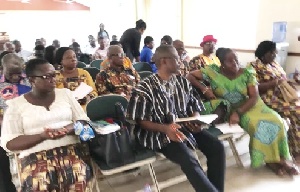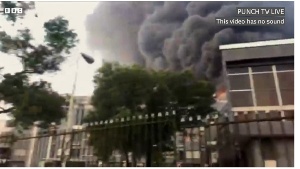- Home - News
- Elections 2024
- News Archive
- Crime & Punishment
- Politics
- Regional
- Editorial
- Health
- Ghanaians Abroad
- Tabloid
- Africa
- Religion
- Photo Archives
- Press Release
General News of Wednesday, 14 May 2025
Source: www.ghanawebbers.com
Exam malpractice a national security threat - WAEC warns
The West African Examinations Council (WAEC) is very concerned about cheating. Some schemes involve entire schools in planned examination malpractice. WAEC says this issue is becoming a national security threat.
The council noted that these unethical acts are often facilitated by students, school authorities, and trusted stakeholders. This poses a serious threat to the credibility of the examination process.
At a regional meeting in Cape Coast last Thursday, Daniel Nii Dodoo spoke for WAEC. He described the trend as harmful to educational integrity and national stability. He called for a united effort to combat this issue.
Mr. Dodoo revealed that despite increased measures, the problem has worsened significantly. Widespread examination malpractice harms honest students and devalues certificates. It may also lead to social unrest.
“This challenge goes beyond classrooms,” he said. “It undermines our educational system and threatens national development.” He emphasized that we must treat it as a national crisis.
He indicated that WAEC recorded high levels of malpractice over the past five years. In 2023 alone, over 587,000 subject results were withheld, with more than 59,000 results canceled outright. The previous year saw over 382,000 results flagged for irregularities.
“These numbers represent a dangerous erosion of academic integrity,” Mr. Dodoo stated. He outlined several national security implications from this crisis. These include producing underqualified graduates and infiltrating public institutions with unqualified personnel.
He warned that if individuals gain power through fraud, it compromises governance integrity. This poses threats not only to education but also to democracy itself.
Mr. Dodoo expressed concern for Ghana's international reputation due to rising malpractice levels. This could discourage foreign investment and academic collaboration.
He mentioned that some WAEC staff have faced threats while performing their duties. “The examining body is under siege,” he said, urging protection for those safeguarding academic standards.
Mr. Dodoo called for a collective response from society against examination malpractice. “Government, parents, schools, religious institutions, traditional leaders, security agencies, and students all have roles,” he stated.
He highlighted the importance of integrity among school supervisors and teacher unions as well as ethical behavior modeling by leaders in education.
The media should continue reporting on malpractice consequences and hold institutions accountable too. “They must help shape a culture of integrity,” he urged.
Religious leaders and traditional authorities should promote honesty among young people as well. “Students need to hear rejection of cheating from every moral authority,” he added.
Regarding resource mobilization for WAEC operations, Mr. Dodoo urged the Parliamentary Select Committee on Education to strengthen oversight and ensure timely funding support.
He appealed to security agencies and the judiciary to take examination fraud seriously and pursue offenders vigorously too.
“This is organized crime,” he stated firmly; it involves networks and corruption needing investigation and prosecution accordingly.
To counter this growing menace, Mr. Dodoo proposed several strategies: strengthening regulatory frameworks with harsher penalties; promoting ethical education; using technology like biometric verification; rewarding whistleblowers; accrediting NGOs for monitoring exam centers; among others.
“Our goal is restoring public confidence in examinations,” he concluded emphatically—ensuring every certificate issued reflects merit rather than manipulation.
John Kapi from WAEC revealed alarming tactics used by cheating syndicates: answer projection, mobile device smuggling, impersonation, even hiding in ceilings during exams.
These actions are not random but increasingly coordinated efforts involving money and external materials aimed at undermining the system.











